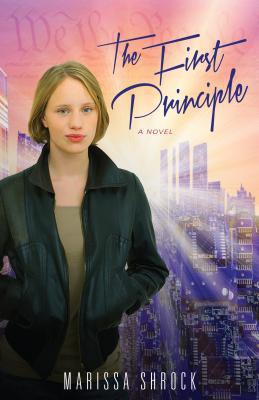‘The First Principle’ Is A Dystopian Engaged With Current Issues
Vivica Wilkins lived at the top. Her mother was governor, and about to become the president of the United Regions of North America. She had straight As, a personal bodyguard, money, social status, and awesome hacking skills.
And then she got involved with a boy and lost all of it, except the hacking skills. This should be a lesson to all of us.
 The First Principle, Marissa Shrock’s debut novel, is a YA dystopian. It struck me initially as verging toward sci-fi, but not because of technology or aliens. It seemed, rather, futuristic, and even if it was an undesirable future, it didn’t have the grimness and desperation I associate with dystopians. I saw no sign of the Apocalypse.
The First Principle, Marissa Shrock’s debut novel, is a YA dystopian. It struck me initially as verging toward sci-fi, but not because of technology or aliens. It seemed, rather, futuristic, and even if it was an undesirable future, it didn’t have the grimness and desperation I associate with dystopians. I saw no sign of the Apocalypse.
Now, on further consideration, I regard it more as a dystopian, and I think the impression of sci-fi came from two things. One, the distance between the characters and whatever catastrophe turned the United States of America into the United Regions of North America. Vivica is sixteen and, far from having any experience of the catastrophe, puts aside a history book because she’s not interested in the depressing details. Two – and this also relates back to character – Vivica is a member of the elite. Although the world she lives in is restrictive, and there are clear intimations of greater troubles just outside her circle of experience, her world hardly feels bleak.
The First Principle is more directly engaged with current issues than other dystopians I have read. No less for that, it still paints a credible and oppressive future, with growing tension between an outward calm and simmering unrest. The dystopian world was well-constructed, real-world elements blended nicely with futuristic elements.
The novel’s plot had its surprises; the common enemy was a well-added factor, layering the story. Drake was an entertaining character, and Vivica’s mother nicely complex. And I enjoyed the interplay between Melvin’s relationship with Vivica, his relationship with her mother, and his own ambitions.
I appreciated how strongly the author used the mother/daughter relationship in this novel. I don’t see that often in the speculative fiction I read, and I am glad when I do. The echo of Jesus’ words a daughter against her mother, a mother against her daughter was effectively played.
My one issue with the book is that it didn’t really sell me on the main character’s two major decisions. The author spent time developing both issues, and the final decisions were reasonable, but I hardly saw the character transitioning to them before, suddenly, she was there.
The First Principle is the first book in a series, and I liked how the author ended it. The essential conflict of the story was resolved, and at the same time there was room for the story to go on – and some clear glimpses that it would go on to greater things. Given the quality of this novel, and the fact that I have very rarely read a series where the first book was the best, I felt confident regarding the next novel.
The First Principle is a well-conceived dystopia with strong character relationships. Recommended.
In conjunction with the CSFF Blog Tour, I received a free copy of this book from the publisher. To see all the reviews and posts on this book, visit Becky Miller’s site.




































